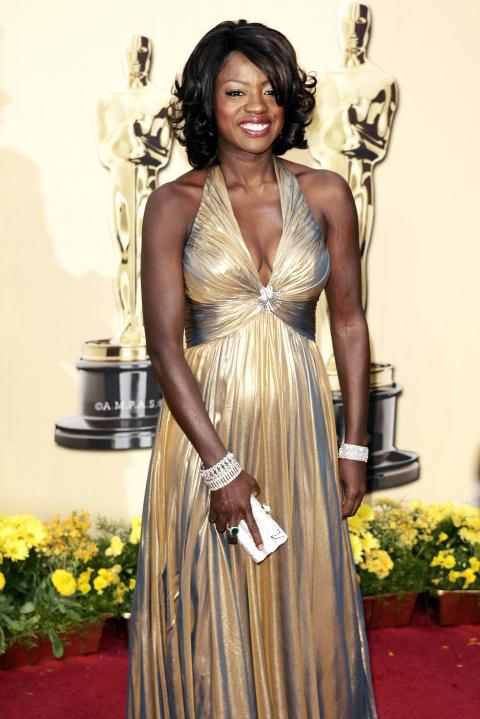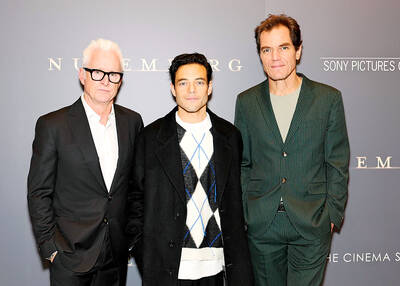Claridge’s hotel in London, on one of the first truly autumnal afternoons of the year. In the famous foyer restaurant, impeccably groomed ladies and suited and booted businessmen greedily conjure up teatime with Nanny against a backdrop of crisp linen, fine china and tinkling piano music.
But Viola Davis is not, apparently, seduced by the sugary pleasures of afternoon tea, ordering a pot of decaf coffee with “heavy-duty cream” and a plate of chorizo (the latter mildly fazes our waiter, although Claridge’s staff are never off-balance for long). Perhaps she feels that she needs something more substantial than a fondant fancy to get across the message that she returns to, with exceptional candor, eloquence and resolve, throughout our conversation: the limited opportunities offered to black actresses by Hollywood and what she wants to do about it.
After 23 years in the business, with an Oscar nomination, two Tony Awards and a host of other prizes to her name, 46-year-old Davis is getting to grips with taking the lead for the first time in a big studio production — she stars as Aibileen, the maid who starts a quiet revolution in segregated “Jim Crow” Mississippi in the adaptation of Kathryn Stockett’s best-selling novel The Help. Davis’ career has been steady and productive, her work both impressively varied and widely acclaimed. But that high-profile film lead has also, until now, been elusive, and certainly to audiences here she is far from a well-known face.

Photo: Bloomberg
“I’ve done what was at my hand to do,” Davis explains. “That’s what’s different about my career as a 46-year-old, dark-skinned actress in Hollywood.” She goes on to detail how — in the absence of the heavyweight roles she might have wished for — she has learned to amplify the parts that have come her way. “I’ve had to sink my teeth into a role that was probably a fried-chicken dinner and make it into a filet mignon.” She considers herself, with clear justification given her Juilliard training and her numerous stage, film and TV credits, “to be just as trained and just as proficient as my white counterparts”; but she also believes that the odds have not entirely been in her favor.
“Hollywood is a business,” she says in a clear, low tone. “And I don’t fault it for that. It’s a business about money and advertising, and we don’t translate in the foreign market. And a lot of people want to indict Hollywood for that, but I don’t think it’s just an indictment on Hollywood; it may be more of an indictment on people who go to the theater to put their money down — to see what? You see a film with a predominantly black cast and you don’t see it as inclusive, but you see a film with a predominantly white cast and it is. Why?”
And that’s why she’s keen to announce that: “I want to be a pioneer; I want to take on the responsibility and the weight of something bigger than myself, which is more diverse storylines, especially for black actresses. But I can only do what I do. I certainly can’t change Hollywood’s complete perception of black actresses — I need help.” Together with her husband, actor Julius Tennon, whom she met on the set of Steven Bochco’s City of Angels 12 years ago and with whom she lives in Los Angeles, she has started up a production company, JuVee. Projects in the pipeline include an adaptation of Ann Weisgarber’s novel The Personal History of Rachel DuPree and a film telling the story of R ’n’ B label Vee-Jay Records.
Had life turned out differently, The Help might also have been a JuVee production. Davis had read the book — which tells the story of a group of black maids who decide to risk their livelihoods in order to chronicle their experiences at the hands of their white employers — and loved it. She had also, she laughs, immediately seen “this greater vision of producing and starring and becoming the savior of all black actresses and giving all my friends roles.” But when the rights turned out to have been snapped up by director Tate Taylor — “the man was not going to give it up,” even when she told her agent to “throw him US$500” — she found herself auditioning for the role of Aibileen, just as she was in rehearsal for the Broadway production of August Wilson’s Fences. “Every black actress came out of the woodwork to be part of this movie and I’m so thankful that he thought of me and gave me a chance. I felt I’d won the lottery, basically.”
The film is a powerful piece of ensemble acting, with especially fine performances by Octavia Spencer as the capricious maid Minny and Bryce Dallas Howard as vile Southern belle Miss Hilly, but Davis is the real standout, creating in Aibileen a woman who has finally reached her moment of resistance. It helped, of course, that her mother, her grandmother and her aunts had also worked as maids: “Beyond the uniform, I knew who these women were.” There is also a comparatively small but crucial role for veteran actress Cicely Tyson, the woman who effectively began Davis’ career. She was only six or seven when she saw Tyson in The Autobiography of Miss Jane Pittman: “I saw her age from 18 to 105, and I didn’t know it was the same actress, and she looked like me, she looked like my mom, bold looks and a dark skin. I was mesmerized, I just couldn’t believe that someone could create that kind of magic. The wind stopped. The birds stopped chirping. It’s one of those moments where I said: That’s what I want to do. And if I can do that, I can absolutely make a life.”
Forty-odd years later, and Davis has clearly made a life in acting, one that has taken her — materially, at least, because she remains close to her family — a long way from her impoverished upbringing in Central Falls, Rhode Island. She determinedly refers to herself as a character actress, and one more suited to the stage than the Hollywood blockbuster: “The great body, the nude scenes, the flashy acting — I don’t fit into that as much,” she says, despite the fact that she is an extremely beautiful woman.
Thanks to The Help, and thanks also to her extraordinary performance in John Patrick Shanley’s Doubt (2008), in which she stole one scene from clean under Meryl Streep’s nose and earned an Academy Award nomination for best supporting actress, her profile is certain to rise. But whatever the medium, she is, she says, most interested in telling stories: “About human beings just living their lives, just being — in all its frailty and in all its ugliness and its putridness, and in all its humor and beauty also.” And despite her feelings about the position of black actors and actresses in the entertainment industry, she is insistent that she harbors no rancor. “I’d love for this not to be a conversation in five years,” she says, but she is also at pains to point out how lucky she feels. “I’m very fortunate with what I’ve been able to do — I’ve been able to make a living as an actor, a really good living — so it would be very unfair of me to see the opportunities that I’ve been given and ... show everybody my derriere.”

The Nuremberg trials have inspired filmmakers before, from Stanley Kramer’s 1961 drama to the 2000 television miniseries with Alec Baldwin and Brian Cox. But for the latest take, Nuremberg, writer-director James Vanderbilt focuses on a lesser-known figure: The US Army psychiatrist Douglas Kelley, who after the war was assigned to supervise and evaluate captured Nazi leaders to ensure they were fit for trial (and also keep them alive). But his is a name that had been largely forgotten: He wasn’t even a character in the miniseries. Kelley, portrayed in the film by Rami Malek, was an ambitious sort who saw in

Last week gave us the droll little comedy of People’s Republic of China’s (PRC) consul general in Osaka posting a threat on X in response to Japanese Prime Minister Sanae Takaichi saying to the Diet that a Chinese attack on Taiwan may be an “existential threat” to Japan. That would allow Japanese Self Defence Forces to respond militarily. The PRC representative then said that if a “filthy neck sticks itself in uninvited, we will cut it off without a moment’s hesitation. Are you prepared for that?” This was widely, and probably deliberately, construed as a threat to behead Takaichi, though it

Among the Nazis who were prosecuted during the Nuremberg trials in 1945 and 1946 was Hitler’s second-in-command, Hermann Goring. Less widely known, though, is the involvement of the US psychiatrist Douglas Kelley, who spent more than 80 hours interviewing and assessing Goring and 21 other Nazi officials prior to the trials. As described in Jack El-Hai’s 2013 book The Nazi and the Psychiatrist, Kelley was charmed by Goring but also haunted by his own conclusion that the Nazis’ atrocities were not specific to that time and place or to those people: they could in fact happen anywhere. He was ultimately

Nov. 17 to Nov. 23 When Kanori Ino surveyed Taipei’s Indigenous settlements in 1896, he found a culture that was fading. Although there was still a “clear line of distinction” between the Ketagalan people and the neighboring Han settlers that had been arriving over the previous 200 years, the former had largely adopted the customs and language of the latter. “Fortunately, some elders still remember their past customs and language. But if we do not hurry and record them now, future researchers will have nothing left but to weep amid the ruins of Indigenous settlements,” he wrote in the Journal of